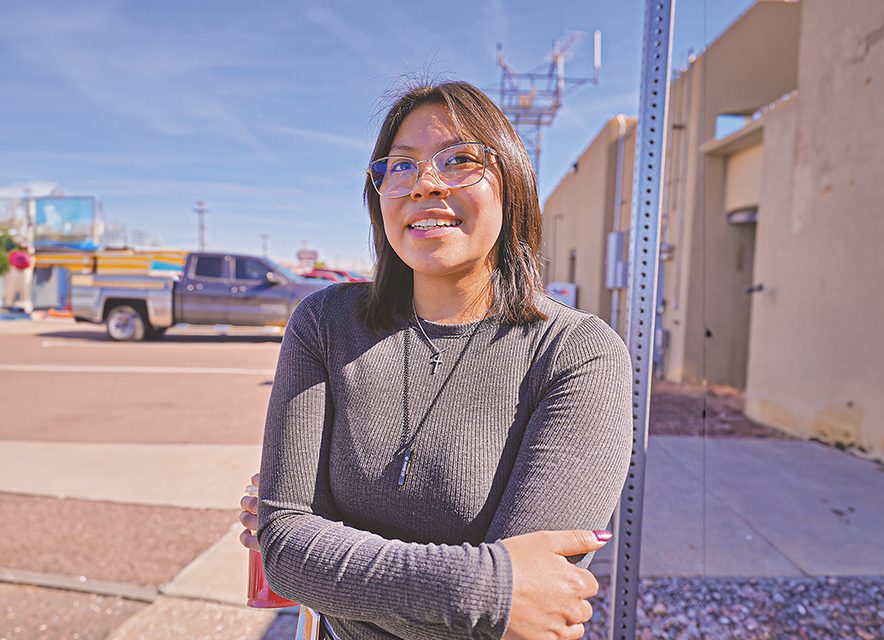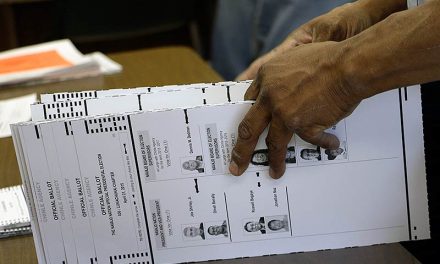
Young voter hopes next national leadership will listen to young people, America’s future

Special to the Times | Donovan Quintero
Gallup native Deja Mooney, 21-year-old Navajo voter, speaks about how she is planning to vote this Tuesday. Mooney said young people like herself become more involved in politics at all levels.
GALLUP
Minnesota Governor and vice-presidential candidate Tim Walz made a campaign stop in Window Rock on Saturday, reaching out to the Navajo community for their support ahead of the upcoming election this Tuesday.
His arrival at the municipal airport drew attention, as heavily armed law enforcement officers patrolled the area. This was an unexpected sight for many locals who were unaware of the visit by a prominent political candidate.
Among those impacted by Walz’s visit was 21-year-old Deja Mooney, a Gallup resident and a passionate advocate for the importance of youth participation in politics.
Mooney, who is currently studying engineering at Fort Lewis College in Durango, Colorado, expressed her enthusiasm about voting and her desire for young people to engage in the political process.
“A lot is going on with everything, not just with us, it’s also with the world,” Mooney said, reflecting on her motivation to vote. “When I was younger, I thought, ‘Oh, it won’t affect me,’ but as I’m older now, I see how it does. It is something that we should take seriously because it impacts not only us but also our families and future generations.”
Mooney’s interest in politics developed during her high school years, shaped significantly by social media which exposed her to a variety of perspectives. This early engagement with political discourse has made her keenly aware of pressing issues that affect both local communities and the global landscape.
Although Mooney describes herself as unbiased in her political views, she finds alignment with Vice President Kamala Harris, appreciating Harris’s proactive approach to addressing critical topics.
“I feel like, right now, with everything going on, she has the willpower,” Mooney explained. “We don’t want any more restricting rights for anyone; we want to bring everyone together. There’s a lot of controversy on both sides, but I feel like she aligns more with my personal perspective.”
Mooney also shared her criticisms of Donald Trump, the Republican presidential candidate seeking a second term, who is scheduled to hold a rally in Albuquerque on Thursday evening.
She expressed discontent with Trump’s demeanor and actions during his presidency.
“It’s really hard for me to agree with him. Just his presentation is not attractive in a professional sense,” she said.
While Mooney acknowledged that Trump’s first term “wasn’t too bad” in terms of some policies, she criticized his tendency to belittle various groups and cultures, suggesting that this behavior undermined his political platform.
“He spoke of helping the country become better, but he also put down others, which creates an imbalance in his political views and plans,” she commented. “It’s mostly about balance.”
Urging Diné to vote Harris-Walz
During his campaign stop, Walz urged the Navajo community to cast their votes for him and Kamala Harris in the upcoming election this Tuesday.
Addressing a crowd of supporters, Walz expressed gratitude for the opportunity to earn the Navajo vote, emphasizing the contributions of Native Americans to the military, particularly honoring the legacy of the Navajo Code Talkers. He reinforced the importance of democracy, contrasting Harris’s commitment to bipartisan assistance with what he described as Donald Trump’s detrimental policies toward women, health care, and tribal communities.
“Kamala Harris is focused on helping all people, regardless of their political affiliation,” Walz stated while outlining the candidates’ platform, which includes tax cuts for families, affordable health care, and substantive investments in tribal economies. He called on the Navajo Nation to recognize the stakes involved in the upcoming election and to mobilize for action.
The rally also served as a platform for broader discussions about the Biden Administration’s commitment to tribal sovereignty and the need for genuine consultation with indigenous leaders in decision-making processes. Walz highlighted the successful codification of consultation into law in Minnesota, advocating for fair and effective border security.
Addressing health disparities, Walz called for increased resources for the Indian Health Service and a greater number of health care providers in rural areas. He stressed the need for adequate support for veterans, including improved mental health services and attention to toxic exposure issues.
Navajo Nation President Buu Nygren echoed Walz’s sentiments, emphasizing the democratic candidates’ commitment to addressing Native American issues. He referenced the historical injustices faced by the Navajo Nation, such as the Long Walk and forced relocation, and praised President Biden’s recent apology to Native communities regarding the mistreatment of children in federal boarding schools.
Arizona Sen. Mark Kelly also joined the call, criticizing Donald Trump for his lack of understanding and respect for Native American issues and veterans. “We need leaders who prioritize our concerns and work to improve our infrastructure, education, and health care,” Kelly urged, imploring the Navajo community to support Harris and Walz.
The role that the Navajo vote could play a monumental role in the upcoming elections in less than two weeks.
Calling for unity
Both Walz and Nygren called for unity and action to ensure that Native voices are heard on a national level.
“This visit shows the breadth and the influence that the Navajo Nation has at the national level. And for a campaign, a big national campaign, to have a campaign stop on the Navajo Nation for the first time, that was tremendous. So, the national government, the people running for office, think of us very highly. And they think of us that if you’re gonna win, you gotta win the Navajo vote, and that’s what today was about,” said Nygren.
Looking toward the future, Mooney hopes for leaders who will protect Indigenous identities and promote open discussions about diverse opinions.
During the governor’s visit to the Navajo Nation, Mooney emphasized the critical importance of allowing marginalized voices to be heard in political discussions.
“I hope they do protect us as keeping our identity, letting us openly express our opinions,” Mooney asserted.
She expressed her belief that community members should have the opportunity to share their perspectives on local and state issues without fear of being dismissed or ignored.
Mooney highlighted the need for political leaders at the local, tribal, and national levels to actively listen to the concerns of younger generations.
“I want them to be accepting and open to our voices. I think that’s just really important for not only just as like a woman and as a minority,” she said.
Her remarks reflect a growing sentiment among young voters, who seek greater representation and inclusivity in political conversations.
Lead over Trump
A national poll released in September by the Institute of Politics at the Harvard Kennedy School indicates that among 18-to-29-year-olds nationwide, Vice President Kamala Harris holds a commanding 31-point lead over former President Donald Trump among likely voters in a multi-candidate matchup.
The overwhelming rejection of Project 2025 among young Americans, with only 6% viewing it favorably compared to 48% unfavorably. Even among Republicans, the poll found that 14% viewed it favorably and 23% unfavorably.
Project 2025 is a blueprint for conservatives, was created by the Heritage Foundation, a conservative think tank, and 140 former Trump Administration officials. It is a comprehensive agenda aimed at fundamentally reshaping the U.S. executive branch. This initiative, described as a roadmap for implementing right-wing ideals, outlines a series of extreme policy recommendations that could dramatically alter various facets of American life.
At the heart of Project 2025 is the “Mandate For Leadership,” a sprawling 900-page manual detailing agency-by-agency strategies to implement conservative policies across the federal government. The project seeks to advance an agenda that opposes key rights and protections, including reproductive rights, LGBTQ rights, immigrant rights, and racial equity.
The implications of Project 2025 are extensive, as it encompasses a variety of proposed changes that threaten constitutional freedoms, according to the ACLU.
Project 2025, violations of constitutional rights and freedoms
Project 2025, the ACLU states, would restrict abortion access by reversing the FDA’s approval of mifepristone, a medication used in abortions, and reinstating the Comstock Act to prohibit the mailing of abortion-related drugs and materials. It would also propose aggressive actions against immigrant communities, including mass deportations, the end of birthright citizenship, family separations, and the dismantling of the asylum system. The project, if implemented, would also limit voting access utilizing executive power to interfere in elections, criminalizing voting procedures, and undermining fair representation. It would also censor educational discussions, promoting censored academic discourse surrounding race, gender, and systemic oppression, threatening federal funding for educational institutions that engage in these discussions. Project 2025 would also attack transgender rights by enforcing discrimination against transgender individuals through federal legislation, penalizing schools for protective policies, and threatening healthcare providers with loss of funding for gender-affirming care.
Critics warn that the policies outlined in Project 2025 could lead to severe violations of constitutional rights and freedoms, fostering an environment of intolerance and repression.
The call for acknowledgment and action is paramount for individuals like Mooney, who feel that their voices are often sidelined.
“It’s really important for us to be able to express ourselves without being pushed away or ignored,” she explained. “So, it’s just really about having our voices being heard.”
As a member of the Navajo Nation, Mooney emphasized the significance of representation in government.
“Having leaders who appreciate and acknowledge our heritage can make a real difference,” she noted. “It’s important for us to be seen and heard in these conversations.”
Walz’s visit to the Navajo Nation marks a broader effort by Democratic candidates to connect with Indigenous communities ahead of the 2024 election. The engagement comes at a time when many young voters, like Mooney, are increasingly aware of the political landscape and its impact on their lives.
‘Engaged in political discussions’
While choosing to keep herself informed of the political maneuverings of elected officials, Mooney said she does not see herself getting directly involved in politics, opting instead to focus on her studies in engineering while staying engaged in political discussions.
“I’m not actively pursuing a political career, but I think it’s so important to stay informed and discuss these issues with others,” she said. “Whether in engineering or another field, I want to contribute positively to society and advocate for what I believe in.”
With the general election just days away, Mooney’s commitment to being an informed voter exemplifies a growing trend among young individuals, especially within Indigenous communities, who are recognizing the power of their voices in shaping the future.
By engaging in political discourse and participating in the electoral process, they are not only making their presence felt but also encouraging others to join them in making informed decisions that will ultimately define the course of their communities and the nation.
In a rapidly changing world, young voters like Mooney are stepping forward to ensure that their concerns are addressed and that their values are represented in government. Through her advocacy for Indigenous rights and youth engagement, she said embodies the spirit of a new generation ready to make its mark on the political landscape.








 Highway 264,
Highway 264, I-40, WB @ Winslow
I-40, WB @ Winslow